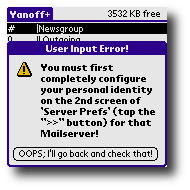New Yanoff Newsreader
 lames have recently been thrown due to confessions about bad experiences with New Yanoff. New Yanoff is the successor of Yanoff, which is the well-known newsgroups reader for the Palm platform.
lames have recently been thrown due to confessions about bad experiences with New Yanoff. New Yanoff is the successor of Yanoff, which is the well-known newsgroups reader for the Palm platform.
Let us begin with compatibility issues. New Yanoff is not compatible with some recent models of the Palm such as the LifeDrive.
Secondly, the user interface of the trial version ($24 for the registered version) is filled with many nags. It is understandable given the purpose of this trial package. Nevertheless, nags were claimed to be excessive.
On to more major flaws, the user interface is relatively unprofessional, as indicated in a Yanoff 3.0 review. Below is one screenshot that has been borrowed from this review.

Example of bad UI design
Finally, the default signature for sent messages bears citations from the bible. It works this way by default and gives no warning and indication that this is happening. To some this will be no cause for concern, but religion, much like politics, is a sensitive issue to many. This is in fact the point which initiated the flames in nntp://comp.sys.palmtops. The developer strongly defended his choice to “spread the gospel” (exact quote), which is a very controversial step among most developers (imposition of the developer’s views).
As the discussion developed, New Yanoff turned out to be a relatively disappointing piece of software that is not sufficiently reliable. GPL Yanoff, which is of course free, can still be downloaded from its Sourceforge Web site.
Cited by: PalmAddict






 Filed under:
Filed under: 
 iscrosoft are slowly letting users of older Windows versions ‘off the leash’. Put differently, old machines are left out there, exposed as easy prey in a world of predators. Windows 98 has not been supported for over 6 months or a year (as far as my recollection goes). Windows 2000 (and ME) support will possibly be conceded too, but maybe it was just rumoured in UseNet. According to a recent survey,
iscrosoft are slowly letting users of older Windows versions ‘off the leash’. Put differently, old machines are left out there, exposed as easy prey in a world of predators. Windows 98 has not been supported for over 6 months or a year (as far as my recollection goes). Windows 2000 (and ME) support will possibly be conceded too, but maybe it was just rumoured in UseNet. According to a recent survey, 
 ood old
ood old 
 here is a well-known issue with the Palm Tungsten E, which appears to have been resolved with the release of the Tungsten E2. A large number of users are have reported a continuous buzz, which makes the use of the handheld quite unpleasant, especially in low-noise environments. An on-going discussion in UseNet reveals more details.
here is a well-known issue with the Palm Tungsten E, which appears to have been resolved with the release of the Tungsten E2. A large number of users are have reported a continuous buzz, which makes the use of the handheld quite unpleasant, especially in low-noise environments. An on-going discussion in UseNet reveals more details. n interesting story from
n interesting story from  The story appears to focus on the algorithms at a relatively technical level. It is made ever more interesting because it speaks of social aspects like ambition and aspiration. For example, it turns out that there was friction among the founders at times, but we all know that the story ended up as a smashing success. On a related note, there in another item from
The story appears to focus on the algorithms at a relatively technical level. It is made ever more interesting because it speaks of social aspects like ambition and aspiration. For example, it turns out that there was friction among the founders at times, but we all know that the story ended up as a smashing success. On a related note, there in another item from  ignificant news (particularly to ‘WordPressers’) have come out from Matt Mullenweg, Co-Founder and Lead Developer of the open-source publishing tool some us know as
ignificant news (particularly to ‘WordPressers’) have come out from Matt Mullenweg, Co-Founder and Lead Developer of the open-source publishing tool some us know as 
